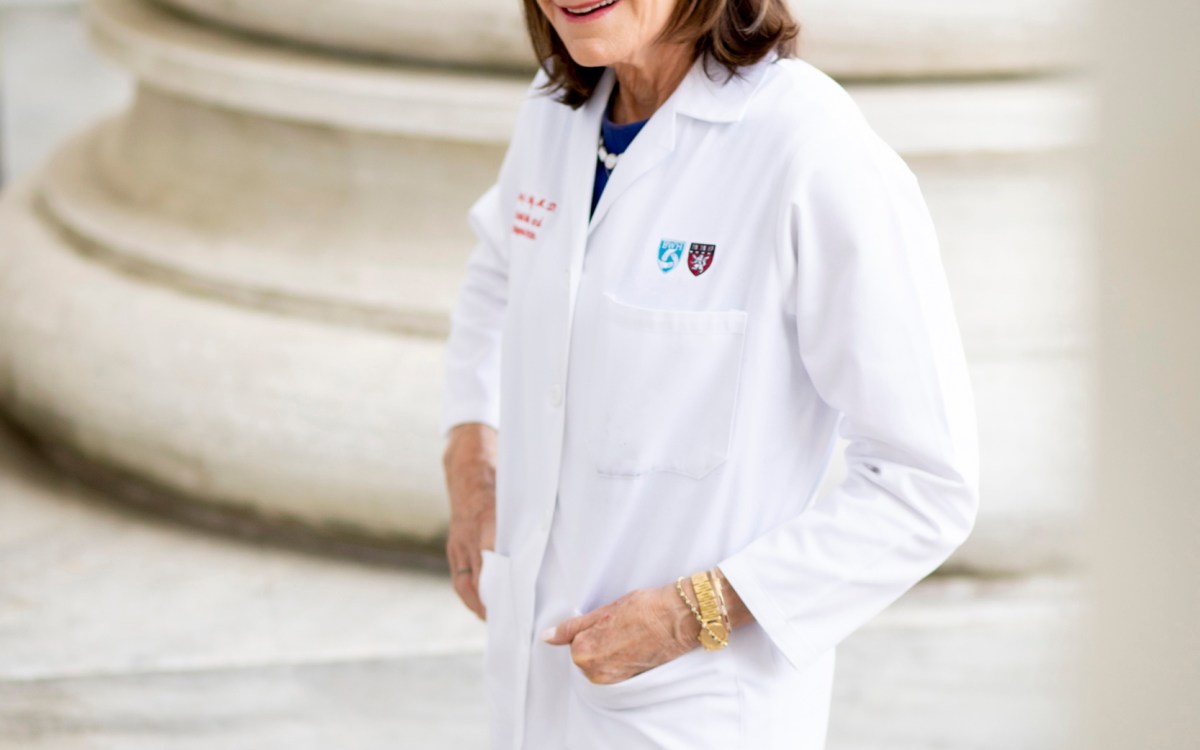
Mladen Zivkovic/iStock via Getty Images
Your memory might benefit from a multivitamin
Researcher details ‘remarkable’ findings, but with a caveat: Healthy lifestyle needs to come first
Researchers at Brigham and Women’s Hospital and Harvard Medical School reported last month that a randomized trial of the humble multivitamin found surprisingly potent effects on memory as we age. The COSMOS-Web Study showed that, among 3,500 subjects 60 and older, a daily multivitamin led to 3.1 years less cognitive aging than for those assigned a placebo. The clinical study was the second cognition trial in COSMOS to suggest that multivitamins can slow memory loss.
Published in the American Journal of Clinical Nutrition, the study was co-led by JoAnn Manson, chief of Brigham’s Division of Preventive Medicine, the Michael and Lee Bell Professor of Women’s Health at the Medical School, and professor of epidemiology at the Harvard T.H. Chan School of Public Health, and Howard Sesso, associate director of the Division of Preventive Medicine, an associate professor at the Medical School, and a Chan School epidemiologist. We talked to Manson about the findings. The interview has been edited for clarity and length.
Q&A
JoAnn Manson
GAZETTE: You found an overall cognitive improvement equivalent to 3.1 years in age-related decline. Can you explain what that means?
MANSON: We saw better performance on memory tests among the participants randomized to multivitamins compared to those assigned to placebo. The benefit was apparent at one year and was sustained over the three years of the trial. Although an initial improvement in memory was seen, possibly due to replenishing of micronutrients in those with deficiencies, the longer-term effect was slowing of age-related memory loss and cognitive aging.
“The fact that two separate randomized trials with different methodologies showed statistically significant benefits of multivitamins compared to placebo is remarkable.”
GAZETTE: You saw no continued improvement over years two and three?
MANSON: The benefit compared to the placebo group was sustained for the three years of the trial, but the amount of benefit plateaued after one year. It remains to be seen whether taking multivitamins for five or 10 years would confer a greater benefit than taking them for three years. I think we need longer trials and trials starting in midlife.
GAZETTE: This is the second COSMOS trial — after COSMOS-Mind, released in 2022 — to find a memory benefit from multivitamins. What’s your takeaway?
MANSON: The fact that two separate randomized trials with different methodologies showed statistically significant benefits of multivitamins compared to placebo is remarkable. There haven’t been other randomized trials of multivitamins — containing all the essential vitamins and minerals — where cognition and memory were rigorously tested and with a baseline assessment of cognition before treatment began. Other randomized trials have generally tested just one or a few of these micronutrients, not a multivitamin with more than 20 essential vitamins and minerals.
GAZETTE: Is this an indication that when considering supplements, we should think of these nutrients together as opposed to searching for one thing that is key to maintaining memory as we age?
MANSON: Yes, it’s unlikely that a single nutrient is a magic bullet. Several micronutrients are known to be important for optimal brain health, and a deficiency of one or more of those essential vitamins and minerals could accelerate cognitive aging. Some people may have a deficiency in one and others may have a deficiency in another. So, taking a multivitamin containing more than 20 of these micronutrients will tend to benefit more people than taking a single isolated micronutrient which would benefit only those people who are deficient in that one micronutrient. It doesn’t mean that every single ingredient in the multivitamin is a major contributor to these benefits. It’s possible it was only a few of the vitamins and minerals. Some of the top candidates are vitamin B12, other B vitamins, vitamin D, lutein, zinc, and magnesium.

“Other randomized trials have generally tested just one or a few of these micronutrients, not a multivitamin with more than 20 essential vitamins and minerals,” says JoAnn Manson, who co-led the study.
Harvard file photo
GAZETTE: One group highlighted in COSMOS-Web was made up of people with cardiovascular disease, among whom the multivitamin seemed to produce a particularly strong effect. You were able to rescue cognitive function in that group, which began lower than the larger sample’s baseline, and bring them back to baseline within a year. What does this say about nutrition and cardiovascular disease?
MANSON: There are many nutritional factors that are important in reducing risk of cardiovascular disease. And it is likely that people with a history of cardiovascular disease have lower nutrient status, at least for certain selected nutrients. That may be why they’re benefiting more. It’s also possible that, because of medications they’re taking or other needs that they have, they benefit more from the multivitamins. We want to drill down more deeply on those findings, because they were very consistent between COSMOS-Mind and COSMOS-Web.
GAZETTE: I remember talking to you previously about how the landscape of supplements is something like the Wild West, with lots of claims and little science.
MANSON: It still is.
GAZETTE: You’ve taken a hard look at several supplements over the years. Have any general guidelines emerged from your studies?
MANSON: There’s a dizzying array of products and most are not tested for safety or efficacy before they get on the shelf. We test dietary supplements that look promising according to several lines of evidence — biological mechanisms, observational studies — and then we do rigorous, randomized clinical trials, which are the gold standard for testing cause and effect.
I think there are several overriding themes. When it comes to dietary supplements, more is not necessarily better and can be worse. One reason multivitamins are surfacing as providing benefits for cognition may be that they’re a comprehensive supplement of daily intake values, not megadoses, of these micronutrients. Once you get into megadoses — and many dietary supplements on the market are very high doses of isolated micronutrients — then it’s more likely that you’ll see risks and toxicities occurring. So, unless there’s a clear indication to take more than the recommended dietary allowance or moderate doses of nutrients, it’s best to avoid megadosing.
Another point is that multivitamins and other dietary supplements should not be perceived as a substitute for a healthy diet or a healthy lifestyle, but as a complementary strategy. Clinicians are sometimes concerned that recommending dietary supplements will lead to complacency about healthy diets and regular physical activity. Nothing is going to replace a healthy lifestyle in terms of fending off chronic diseases and achieving a longer health-span. It is really important that people understand that.
These two cognition trials in COSMOS suggest that multivitamins can be a safe, affordable, and accessible strategy for protecting cognitive health in older adults. Based on the consistency of the findings, I think we can now say, “A multivitamin a day helps keep memory loss at bay.” I do think the evidence for that is exciting, compelling, and warrants further study to identify those most likely to benefit.







